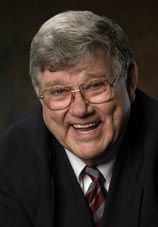|
 |
| Teachers.Net Gazette Vol.6 No.3 | March 2009 |
Subscribe for free home delivery |
|
Fifty Years of Teaching By the time building administrators realized I was not following policy, my students were learning, successful, happy, and thriving. | ||
| by Bill Page www.teacherteacher.com Regular contributor to the Gazette March 1, 2009 |
||
 Totally unprepared to teach, 27 years old, and with no interest or experience whatsoever, I reluctantly accepted a stopgap job as an eighth grade English teacher. I didn’t know anything about teaching, and I had a lousy attitude, “If I don’t like teaching, I’ll quit, whether that’s at the end of the first day or first week.” Furthermore, I didn’t like kids. I didn’t dislike them either–I just didn’t know what they were, what they were like, and had no interest in them. To my delight, I loved the job and got a kick out of the kids. They were funny, and I laughed at them instead of yelling and griping as some of my fellow teachers did. Striving day-by-day as a new teacher, I suffered asinine school policies, contradictory directives from administrators and useless advice from colleagues. The prevalent teaching-learning concept was based on fear, intimidation, reward and punishment, negativism, and ordinate-subordinate relationships. Many teachers seemed angry at the kids and obsessed with control. I found teaching expectations so contrary to my own goals, I became perplexed and disillusioned. Unlike my schooling experiences where boredom and fear of failure ruled, I wanted interest and satisfaction for my students. What I was supposed to do as a teacher had no connection to what made sense. I quickly developed a teaching mantra, “I will do what makes sense.” Still “just a teacher” after fifty years, I am delighted to share my successful teaching strategies. (I shall share my many unsuccessful techniques another time.) However devious, unorthodox, unheralded, and sometimes unprofessional or unethical my teaching-learning methods, they are all researched, tested, and proven—by me. Besides my guiding mantra and the abundance of constant, honest, and innocent feedback from my students, I can attribute my different-but-successful teaching to four factors:
With my naïve, stubborn, iconoclastic procedures, I was a long way from traditional teaching expectations. Administrators encountered difficulty dealing with me. One principal wrote in my file, “He has the courage of his convictions;” intending it as a derogatory entry. By specializing in teaching “troublemakers”, who had already failed standard school procedures, I “got away with” some circuitous methods. Having more success with the problem learners than some teachers were having with the good kids got me even more problem kids and prevented me from quitting or being fired. Here are strategies I developed that permitted me to continue my unorthodox, expedient procedures that made sense and brought success.
I acquired expedient teaching strategies through:
I endured and exploited lessons of:
*Desperation and panic Through these procedures, I learned to be a successful, satisfied teacher of successful, satisfied students. | ||
|


 Bill Page, a farm boy, graduated from a one-room school. He forged a career in the classroom teaching middle school “troublemakers.” For the past 26 years, in addition to his classroom duties, he has taught teachers across the nation to teach the lowest achieving students successfully with his proven premise, “Failure is the choice and fault of schools, not the students.”
Bill Page, a farm boy, graduated from a one-room school. He forged a career in the classroom teaching middle school “troublemakers.” For the past 26 years, in addition to his classroom duties, he has taught teachers across the nation to teach the lowest achieving students successfully with his proven premise, “Failure is the choice and fault of schools, not the students.”